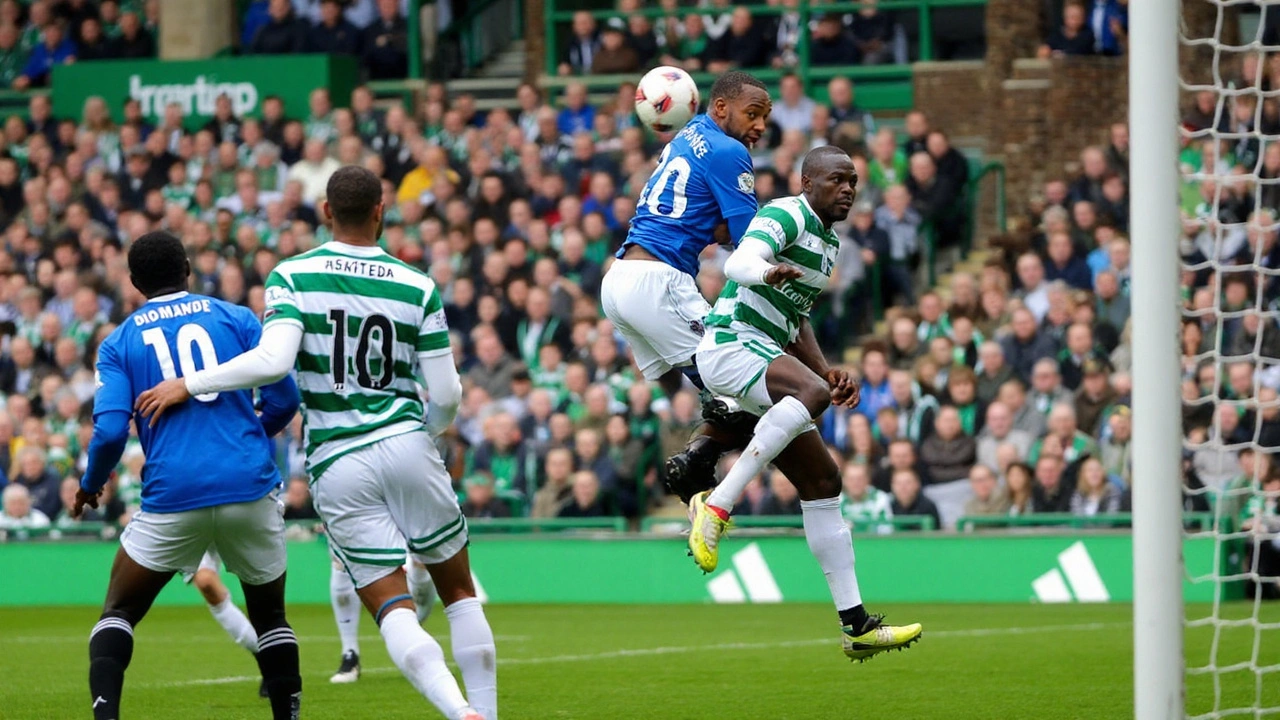A derby that swung wildly
An 88th-minute strike from Hamza Igamane flipped Parkhead on its head and handed Rangers a 3-2 away win in a breathless Old Firm. Celtic had clawed back from two down and looked set to salvage a point, only for the Rangers substitute to steal the show late and silence a packed home end. It was Celtic’s first home league defeat of the season, a sting softened only by the fact they still hold a 13-point cushion at the top.
This one had everything: a lightning start, a furious comeback, and a late dagger. Rangers, who came in under pressure to prove they could land a punch at their rivals’ ground, did more than that. They struck early, added a second before the break, absorbed a storm, and then—just when the draw felt inevitable—found the nerve and quality to win it at the death.
The tone was set inside five minutes. From a James Tavernier corner, Nicolas Raskin got free and powered a header past Kasper Schmeichel. Short corners and elaborate routines are on trend, but this was as old-school and effective as it gets: delivery, movement, contact, goal. It stung Celtic and gave Rangers exactly what you want in a derby—belief.
Barry Ferguson’s side didn’t just sit on it either. They used the ball with purpose, broke lines when the chance was there, and picked their moments to press. Mohammed Diomande’s strike in the 37th minute doubled the lead and underlined Rangers’ calm on the ball. Celtic looked rattled. Parkhead, so often a wall of noise, turned anxious. Rangers smelled it and managed the rest of the half with control.
Tavernier summed it up on the pitch and after the whistle. “Obviously happy to get the result,” he told television cameras. “We had a really good first half and maybe sat off a bit much second half. Delighted to get the three points. It’s been a good week for the club. We showed resilience, we were brave on the ball and took our chances. We were clinical.”
You could feel the reset coming after the break. Celtic needed intensity, quick combinations, and more runners beyond the ball. They got it. Within four minutes of the restart, Daizen Maeda pulled one back, the kind of straight-line break that Celtic thrive on when they move the ball faster and get support into the box. That goal changed the air in the stadium. Every duel started to feel like a decider.
Rangers were suddenly a step deeper, more cautious, and a little rushed in transition. Celtic pinned them in for long spells, and the equaliser felt like a matter of time. Reo Hatate delivered it in the 74th minute, a clean, composed finish to crown a spell of pressure. For Rangers, the equation was brutal: either find a final push or leave with what would have still been a credible point after being under siege.
They chose the former. Ferguson went to his bench, looking for energy and one moment of clarity in the final third. Igamane provided it. With two minutes left in regulation, the striker latched onto a break, opened his body, and found the far corner with a finish that screamed conviction. Rangers’ away end exploded; Celtic Park froze. These are the seconds that make this rivalry what it is.
It was the kind of goal that doesn’t just win a game; it wires a season. Tavernier made a point of the group’s mentality in recent weeks: “With the character we’ve shown in the past few weeks, we had belief to the end and Hamza pulls off a great goal. Delighted for the boys.” You could see that belief in the way Rangers closed it out—no panic, no unnecessary fouls, just secure touches and a clean exit when they needed it most.
There’s a tactical layer worth spelling out. Rangers’ first-half control came from simple principles executed well. The back line stayed connected and compact, the midfield sat on passing lanes, and the wide players tracked without being dragged too deep. When they won it, they didn’t force it. They fed runners, found Tavernier on the overlap, and made Celtic defend facing their own goal. Set pieces were a clear target, and the opener validated that plan immediately.
Celtic’s response after the break flowed from a different kind of control—relentless pressure. They pushed their full-backs higher, got midfielders breaking lines, and they tested Rangers with quick diagonals and second balls. It wasn’t pretty for the visitors, but it was effective for the hosts. Maeda and Hatate’s goals came from speed of thought and a willingness to flood the box. The flip side was space behind, and when Rangers finally sprang it, Igamane made the moment count.
Matches like this often turn on details you barely notice live. A toe on a through ball, a shoulder in a duel, a split-second when the press is half a step late. You could pick out a handful here. Raskin’s timing for the header. Diomande’s decision to take an extra touch before shooting. Hatate’s pause before picking his spot. And Igamane’s choice to keep it low rather than smash through the ball. Tiny calls, major consequences.
For all the chaos, there was a sense both teams played true to type. Celtic trusted their engine and waves of pressure; Rangers leaned on shape, set pieces, and opportunism in transition. If you coached either side, you’d probably say the match proved your point. Both managers could make a case their system worked for long spells. Only one, though, left with the points.
Individually, a few names popped. Raskin’s early header will headline, but his work off the ball protected Rangers when Celtic targeted the channels. Diomande covered ground and gave them a steady exit option in the first half. Tavernier had the kind of captain’s day that doesn’t always show up in highlights: delivery on set pieces, vocal organisation, and the right foul at the right time when momentum threatened to spiral.
For Celtic, Maeda never stopped running the inside-right lane, a constant headache for the visiting defense. Hatate’s touch and timing returned right when his team needed it. Kasper Schmeichel could do little about the goals conceded and kept Celtic alive with interventions when the game threatened to tilt before the interval. And while Jeffrey Schlupp was beaten for the opener, he battled to turn the tide later with aggressive steps into midfield.
There was no shortage of steel either. Both sides tackled, pressed, and chased lost causes—par for the course in an Old Firm. But the discipline, by and large, held. No major flashpoints, no long stoppages to kill the rhythm. That helped the spectacle and probably helped Celtic mount their second-half surge. It also left the door open for that one last counterattack, the one Igamane finished with such calm.
Strip away the noise and the core story is simple: Rangers walked into a place where Celtic had been perfect in the league, built a two-goal lead with smart, direct football, took the best the champions could throw at them, and still found a way to win. On days like this, scorelines are more than numbers—they’re markers of intent.

What it means and what’s next
The league picture doesn’t swing on one game. Celtic remain clear at the top by 13 points, a margin built on consistency that no single defeat erases. But the psychological edge shifts a little when you lose at home in this fixture. The unbeaten home run was both shield and sword; now it’s gone, the next response matters.
For Rangers, this is a result you bank and then build on. Ferguson has been asking for bravery on the ball and bite without it. He got both in a high-stress environment. The bench delivering a match-winner matters too. It says the group is deeper than the starting XI and that late risk is worth taking when a point feels safe.
Across the city, Celtic can take heart from the second-half surge. The buttons they pressed worked, their leaders stepped up, and the patterns produced goals. What will sting is the shape in transition late on and the way a counter split them with the finish line in sight. Training this week writes itself: rest defense, restarts, and sharper decision-making at 2-2.
Beyond the tactics and tables, this match reminded everyone why this rivalry grips the neutral and defines a season for both clubs. It’s not just the noise or the speed. It’s the sense that one touch can change everything. Raskin’s header did. Diomande’s finish did. Maeda and Hatate did. And Igamane, with two minutes left, did most of all.
Key moments that shaped the day:
- 4’ — Raskin rises to head in Tavernier’s corner for 0-1.
- 37’ — Diomande doubles Rangers’ lead after a composed move.
- 49’ — Maeda cuts the gap to 1-2 as Celtic start fast after the break.
- 74’ — Hatate levels at 2-2 to set up a frantic finish.
- 88’ — Igamane wins it with a clinical strike into the far corner.
Parkhead has hosted dozens of dramatic chapters in this fixture. This one will sit near the top for how sharply it turned and how late it was decided. Rangers got the start they needed and the ending they dreamed of. Celtic got the fightback they demanded but not the closure they expected. And the title race keeps its shape—for now—with a little more edge the next time these two meet.
